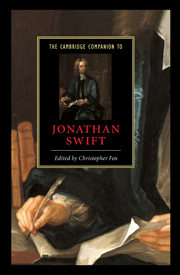Book contents
- Frontmatter
- Introduction
- 1 Swift’s life
- 2 Politics and history
- 3 Swift the Irishman
- 4 Swift’s reading
- 5 Swift and women
- 6 Swift’s satire and parody
- 7 Swift on money and economics
- 8 Language and style
- 9 Swift and religion
- 10 Swift the poet
- 11 A Tale of a Tub and early prose
- 12 Gulliver’sTravels and the later writings
- 13 Classic Swift
- Bibliography
- Index
6 - Swift’s satire and parody
Published online by Cambridge University Press: 28 May 2006
- Frontmatter
- Introduction
- 1 Swift’s life
- 2 Politics and history
- 3 Swift the Irishman
- 4 Swift’s reading
- 5 Swift and women
- 6 Swift’s satire and parody
- 7 Swift on money and economics
- 8 Language and style
- 9 Swift and religion
- 10 Swift the poet
- 11 A Tale of a Tub and early prose
- 12 Gulliver’sTravels and the later writings
- 13 Classic Swift
- Bibliography
- Index
Summary
The key concept for understanding Swift's satire is not a rhetorical precept about persona, but a deeply held principle about what it means, in Swift's view, to be a person. For Swift, language, religion, and politics are not strictly divisible, but are all inextricably linked as integral parts of human endeavor. The serious business of Swiftian satire is that it invites (or provokes) the reader to be critical: that is, to judge. Most often, the judgments that Swift's satires ask us to make go well beyond straightforward condemnation of the work's obvious target; rather, we are led to form a series of deeper judgments about language, religion, and politics, and about the operations of human vice and virtue that govern these activities in others and in ourselves. The comic exuberance and imaginative plentitude that often characterize Swift's satirical writings should not blind us to the fact that Swift, though never moralistic, is a relentlessly moral writer. Even when being self-denigrating about its aesthetic qualities, Swift himself is adamant about the purpose of his work: “I have been only a Man of Rhimes, and that upon Trifles,” he writes, “yet never any without a moral View” (C iv: 52). This “moral view” pervading Swift's writings in both poetry and prose is not about adherence to a set of pious ordinances, but is deeply concerned with how people act as linguistic, religious, and political beings.
- Type
- Chapter
- Information
- The Cambridge Companion to Jonathan Swift , pp. 112 - 127Publisher: Cambridge University PressPrint publication year: 2003
- 2
- Cited by

